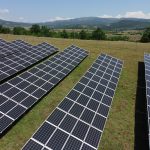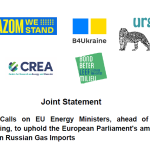CAN Europe sent the following letter to Energy Ministers ahead of the Informal Environment Council on 12-13 July 2016
Dear Environment Minister
Ahead of the informal Environment Council we, European NGOs working on climate change, would like to summarize our views on the international climate negotiations, the Innovation and Modernization Funds, and on new governance.
International Climate Negotiations
The Paris Agreement was a milestone. For the first time in history all countries have agreed to take drastic action to protect the planet from climate change, to jointly pursue efforts to limit temperature rise to 1.5°C and eventually reduce greenhouse gas emissions to zero. The Agreement now needs to urgently be translated into deep emission cuts in every country.
Increasing mitigation action before 2020 is vital for achieving the long term goals of the Paris Agreement, and will be one of the key issues for the COP in Marrakech to succeed. The EU can make a significant contribution to this discussion by, inter alia, cancelling the surplus of pollution permits under the Emissions Trading Scheme and the Effort Sharing Decision.
Furthermore, in order to achieve the objectives of the Paris Agreement, it will be crucial that the facilitative dialogue in 2018 delivers results. We will need all countries to improve their post-2020 targets well before 2020, as stipulated in the Paris Agreement. It will be crucial that COP22 calls upon all countries to start a revision process of their INDCs, so that by the time the facilitative dialogue starts, countries will be able to make substantial contributions. The EU has played a crucial role in getting the Paris Agreement and can again play a central role in the early revision of the INDCs by agreeing, before COP 22, on a process to revise its own INDC, as well as by ensuring revision clauses are integrated in all legislative files linked to the EUs INDC.
Modernization and Innovation Fund
Both Funds can play a crucial role in helping European governments, businesses and citizens to make a just transition into a zero carbon society. The ETS Directive must therefore specify project eligibility criteria with an exclusive focus on energy savings and renewable energy. It must furthermore state that to be eligible for funding Member States must ensure full transposition of all relevant EU legislation.
For the Innovation Fund the Directive must establish an absolute cap of € 300 million that can be awarded to one project. The Modernisation Fund should build on existing experience with the cooperation between the European Commission and the European Investment Bank, and draw on features of the European Fund for Strategic Investments and the existing Cohesion Policy implementation including the role of national and regional managing authorities.
In addition to these two Funds, the ETS Directive should also include a fund to finance international climate action and a Just Transition Fund to support local communities and workers in regions impacted most strongly by the ongoing transition to a decarbonised economy.
New governance
Governance is important not only in meeting the EU’s 2030 targets, but also in supporting the core conditions for an orderly transition – namely: strong investor confidence in the policy and regulatory regime, energy solidarity and trust, and public support.
National plans must include a long-term horizon up to 2050 and need to be anchored in a legislative framework that includes binding templates that detail data requirements to ensure accountability, transparency, legitimacy, and the meaningful participation of stakeholders.
One single report covering everything, including all the international reporting obligations in the EU, would lead to a significant loss of detailed information. Separate and detailed reporting is necessary, in particular for the three EU headline targets (GHG, energy efficiency and renewable energy), and for addressing policies that undermine these targets, such as fossil fuel subsidies.
Dear Minster, we are calling upon you to show the rest of the world that the EU understands the urgency and depth of the climate crisis and is willing to do its fair share to ensure the Paris goals can be met.
Kind regards,
Wendel Trio, Director CAN Europe



